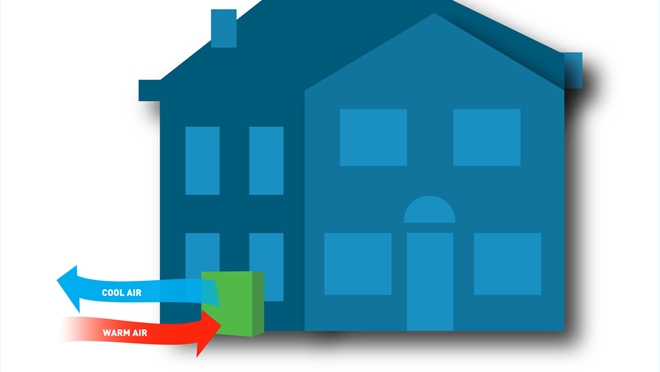
HVAC & Plumbing
Residential
Considering a heat pump?
February 3, 2015 - One of the most popular questions that comes up for homeowners considering renovations these days is whether to replace existing heating systems with an energy-efficient heat pump.
February 3, 2015 By BC Hydro

For those planning major renovations or upgrades to their heating system, a heat pump can be much more efficient than traditional gas or electric furnaces or baseboard heaters.
But that efficiency can quickly be lost when heat pumps are used improperly, or when their performance isn’t fully understood.
We here at BC Hydro asked Greg Morandini, team lead for Power Smart Engineering, to help pinpoint some of the questions that homeowners should ask when considering a heat pump.
What is a heat pump, and how does it work?
Heat pumps work by extracting heat from the air or the ground outside, and pushing it inside to heat your home. Even when temperatures are relatively cool, there’s enough ambient heat to allow an efficient exchange. Because heat pumps move heat directly, rather than converting fuel into heat, they’re more efficient than baseboard heaters or furnaces.
But all heat pumps come with a backup heating system that kicks in when the temperature is too cold to allow heat transfer. The backup system isn’t as efficient, so if it’s running constantly, you’ll lose the efficiency and savings that heat pumps can provide.
Start by considering your heating and cooling needs
Although many customers are interested in heat pumps because they pump warm air out of your home in summer, it’s important not to think of them as “free” cooling. In fact, for many customers, the cooling provided by heat pumps could increase your electricity costs.
Morandini says that most regions of B.C. only have short periods of time each year where home cooling is needed. For most customers, your home’s heating needs will be the most important when considering whether a heat pump is right for you.
• If you have a gas furnace and you switch to an electrically-operated heat pump, your winter gas bill may decrease, but your electricity bill will go up. While fuel prices vary, gas is typically cheaper than electricity per unit of heat produced.
• If you’re planning to use the heat pump for cooling purposes in the warmer months and your home doesn’t already have a central air conditioning unit or extensive use of portable/single air conditioners, your electricity bill will increase, because you’re adding costs for cooling that you don’t currently have.
• A central air source heat pump (ASHP) works most efficiently in temperatures above 0° Celsius. If the winter temperature in your region is consistently below 0° Celsius, your backup heating system, whether electric or gas, will kick in to keep your home warm. This could mean increased heating costs as the backup system won’t be as efficient as a heat pump.
• Ductless heat pump systems are another option to consider. They use a slightly different method of heating and cooling distribution in your home and are often more efficient than the central units. They may work better in cooler climates and can typically handle outdoor temperatures down to -15C, or colder, without relying on the backup systems.
• Ground source heat pumps can be even more effective in colder temperatures, however, as these systems often have more up-front costs and technical requirements, it’s important to engage specialized contractors for design and installation.
Draftproofing and insulation can be more effective ways to reduce heating costs
If your goal is to realize savings on your heating and cooling costs, a heat pump shouldn’t be the first option you consider.
Instead, consider your building envelope. No matter which way you heat and cool your home, drafts and cracks can render your system inefficient, and cost you money. Attics, basements and crawlspaces are great places to upgrade your insulation, which can substantially improve the building envelope and reduce energy loss.
Rebates available for energy-efficient upgrades and ductless heat pumps
You can save money and energy on all kinds of energy-efficient upgrades through the Home Energy Rebate Offer program.
• Rebates of up to $1,200 are available for upgraded insulation, such as exterior walls and basements.
• Draftproofing measures may be eligible for rebates of up to $500.
• Ductless heat pumps for electrically-heated homes are eligible for rebates of $800.
If you decide to move forward installing a heat pump, your contractor can advise on the type and size that will work best for your needs.
Print this page